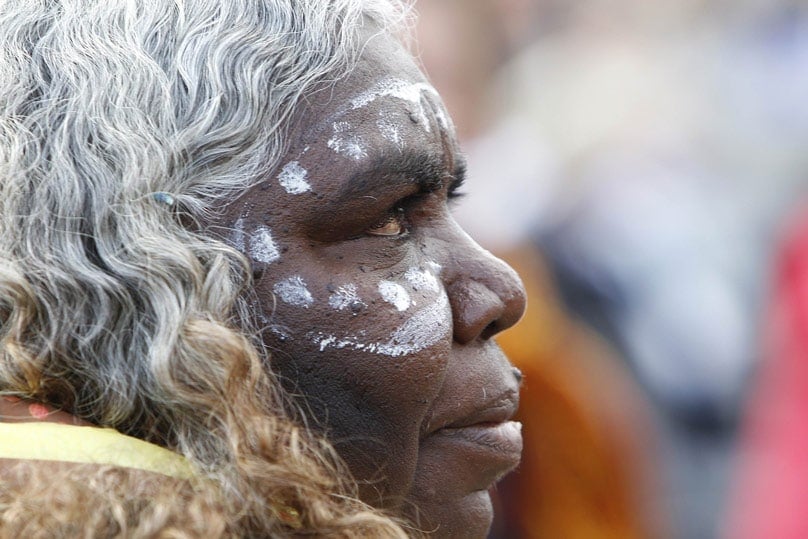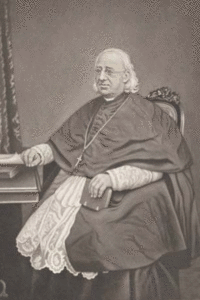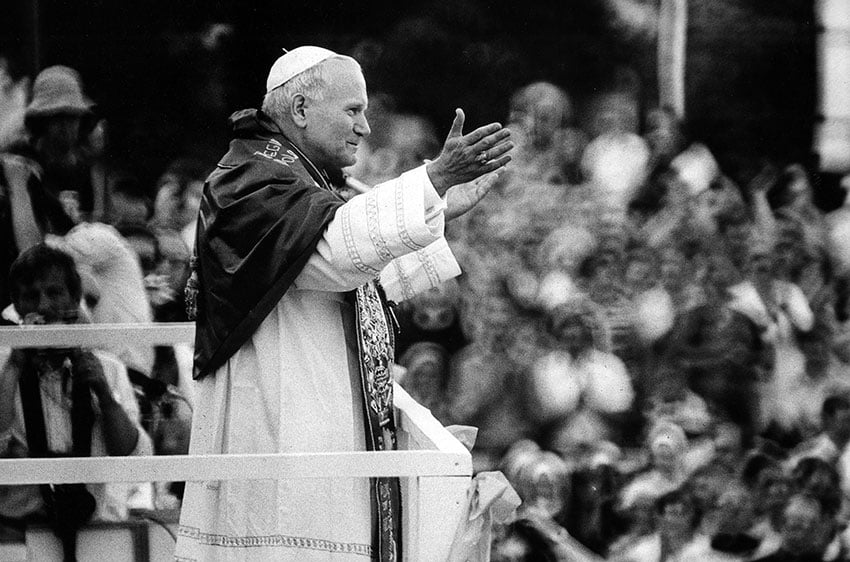
By Annemarie McLaren
In 1846, John Bede Polding, the Catholic Archbishop of Sydney, was asked to give evidence to a committee tasked with reporting on “the condition” of Aboriginal people in the colony and why their numbers were decreasing.
This committee asked Archbishop Polding a raft of telling questions. He was asked what “position in the scale of humanity” he considered Aboriginal people to be, and whether they were “lowest in the scale” or just “exceedingly low.”
Archbishop Polding chose his words carefully. He said that his views were not theoretical but formed by his own encounters with Aboriginal people. He then detailed how in his conversations with Aboriginal people, he “invariably found a deep sorry prevailing … They appeared to me to feel their position and state very acutely.” By state, he meant “the fact of the whites coming to take possession of their lands, without giving them what they deemed an equivalent.”
The commissioners responded to this line of thought with the question, “Do you not think you are assuming too much in supposing they could have such feelings?”
Archbishop Polding went on to speak of the hardship caused as farms and stock claimed Indigenous lands and means of living. (In a letter to the Vatican in 1847, he wrote of “invaders who destroy and scatter their crops and animals.”)
He also spoke of uncontrolled frontier violence, of massacres, of the sexual abuse of Aboriginal women by settler newcomers, and of educated men who, in his words, thought “there was no more harm in shooting a native, than in shooting a wild dog.” Another colonist thought it was “preposterous to suppose they had souls.”

There is a marked similarity in the words of Archbishop Polding and those of Pope John Paul II when it comes to Indigenous peoples. When John Paul II addressed Aboriginal and Torres Strait Islander people in Alice Springs in 1986, he praised Archbishop Polding for upholding the idea that Aboriginal people had rights and affirmed that Indigenous cultures were “precious” and “must not be allowed to disappear.”
John Paul II described the 20th century story of Aboriginal people as one of “transport[ation] from homelands into small areas or reserves where families were broken up, tribes split apart, children orphaned and people forced to live like exiles in a foreign country.” He recognised that “the effects of some of those forces are still active … today.”
John Paul II knew what he was talking about. As a Pole, he endured Nazi invasion and the atrocities of war. He also suffered attempts to stamp out his beloved culture and language, and he was part of an underground theatre to preserve Polish language and literature.
The sorry history of Aboriginal experience in the twentieth century that John Paul II sketched was enabled under our present Constitution, which was created at the height of racial science in the Western world.
Under this Constitution, “protectors” of Aboriginal people were appointed who in many states were granted automatic guardianship of Aboriginal youths and the power to deny marriages if the children produced would be as dark or darker-skinned than the parents. During these decades, speaking traditional languages was often forbidden, and wages were held “in trust” for Aboriginal people—funds that rarely appeared when asked for.
Australians love the constitution and, judging by the low success rate of referenda, are reluctant to change it. It does not take much imagination to understand why Indigenous Australians are wary of the constitution. In their own country, it has repeatedly failed them.
The famous 1967 Referendum has not fixed the fact that the constitution was written to deliberately exclude Aboriginal people who were thought to be dying out.
Nor did it address a long history of settler interference in and disruption of Indigenous lives. In fact, the 1967 Referendum passed during the era of “assimilation,” when it was hoped that Aboriginal people would abandon their cultures and merge into the mainstream.
While the 1967 Referendum meant that the Commonwealth Government could now make laws just for Indigenous people, it did not mean that Indigenous people had a say in how, when and why this power was used. The upcoming referendum on a Voice to Parliament and the wider Uluru Statement seeks to address this very real issue—and more.

The Catechism of the Catholic Church speaks of the principle of subsidiarity. This principle affirms the dignity of individuals and means that no decision that can be made at a lower level of society—by a family or local community, for instance—should be made by a higher body. The National Aboriginal and Torres Strait Islander Catholic Council describes subsidiarity as a principle that recognises that “the people closest to, and most affected by, the issues are the ones best placed to address them, with the help of government.”
I am an historian, not a theologian, but it seems to me that Indigenous Australians are asking for the principle of subsidiarity to be put into better practice through the proposed advisory body, or Voice to Parliament.
After all, the Voice asks for a permanent seat at the table, and a greater say in designing, implementing and evaluating programmes and policies that affect Indigenous lives.
Is the Voice needed? The great majority of Indigenous Australians say it is. The Solicitor General says it will enhance participation in our democracy. The Uluru Statement speaks of “the torment of powerlessness,” citing high incarceration rates and the number of children separated from their families.
Torment is a troubling word. It speaks of profound suffering and disempowerment within Australia. High suicide rates and lower life expectancy would seem to confirm this, despite us being “the land of the fair go.” The Uluru Statement, written to all Australians, says that “when we have power over our destiny our children will flourish.” It speaks of the hope of Indigenous children who will “walk in two worlds” and a culture that “will be a gift to their country.”
John Paul II, drawing on Pope Paul VI, said the desire “to have more in order to be more” was a wonderful thing. Speaking to the Indigenous peoples of Canada, he affirmed “the right to a just and equitable measure of self-government, along with a land base and adequate resources necessary for developing a viable economy for present and future generations.”

Indigenous people have just and natural rights within nation states. At Alice Springs, John Paul II said that “a just and proper settlement … still lies unachieved.” He entreated that “what can be done to remedy the deeds of yesterday must not be put off till tomorrow.”
Drawing on his training in philosophy, he added, “let it not be said that the fair and equitable recognition of Aboriginal rights to land is discrimination.”
As an historian, I can add that the idea of race is a thoroughly debunked scientific idea. We no longer believe in different types of humans, some higher and lower in the scale of humanity, as was once common. If some say the Voice will divide Australians based on race, this cannot be true.
In the raging seas of debate, what is clear is that Catholic tradition and social teaching speaks of the unique rights of Indigenous people, grounded in the dignity of the human person, and principles of natural justice.
On the question of Aboriginal people in 1846, Archbishop Polding wrote that “his opinion may be very different from that entertained by the greater part of the community.”
His words and the words of John Paul II offer Catholics much guidance in the days ahead to October 14.
Dr Annemarie McLaren is an historian of the late eighteenth century and early nineteenth century world and the British empire, with a particular interest in the Indigenous societies encountered and how intercultural exchange took place. In 2020, her doctoral thesis was awarded the biennial Serle award for best postgraduate thesis in Australian history by the Australian Historical Association. She has also been the recipient of national and international research and essay prizes. She lectures at the University of Notre Dame, Australia.
